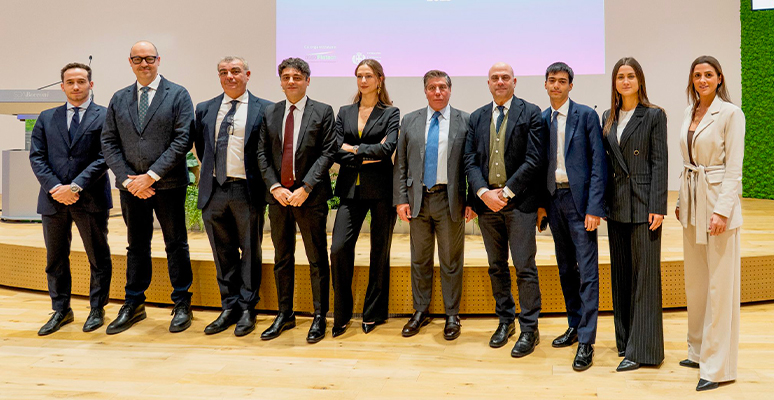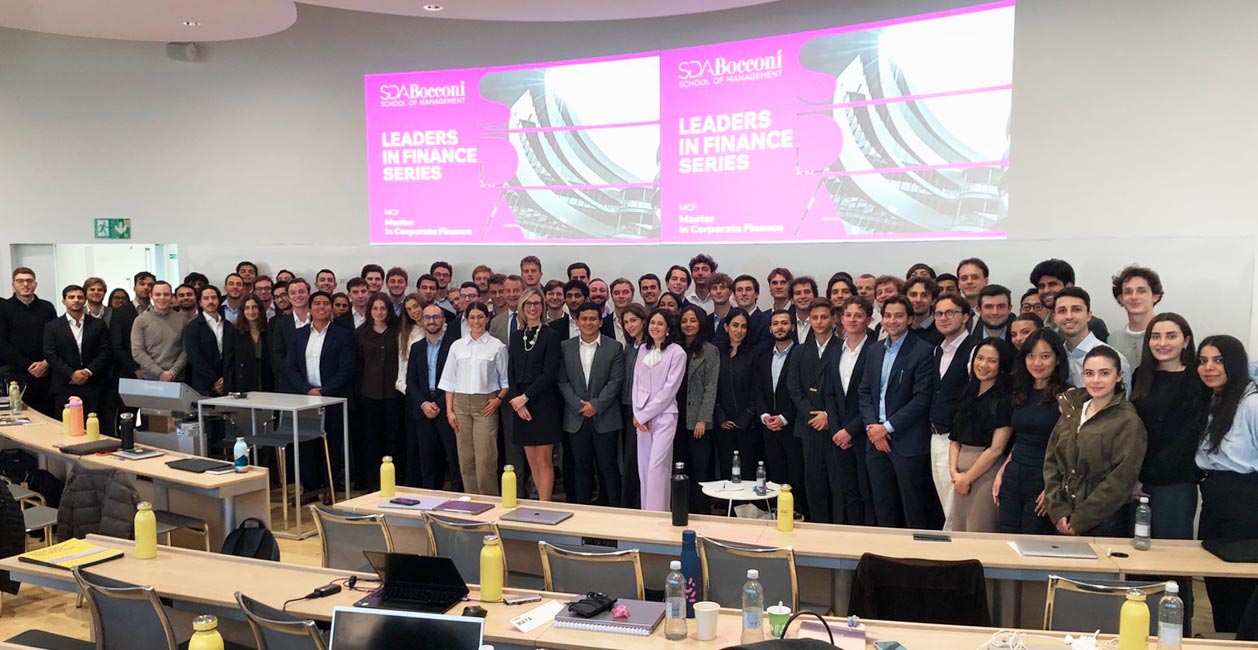
- Start date
- Duration
- Format
- Language
- 3 Dec 2025
- 3 Days
- Class
- Italian
Acquisire competenze su finanziamenti, business plan e valutazione avanzata delle startup per concepire, lanciare e far crescere nuove imprese.
It's true that Corporate Finance has universal concepts, which transcend companies and countries that they’re based in, but the evolution of the role of Finance requires more extensive knowledge: "the CFO must have an in-depth knowledge of the sector and the company in which they operate." This is one of the important messages that emerged from the CFO Series by Giuliano Giannessi, CFO of the Dolce&Gabbana Group, who met with the participants of EMF - Executive Master in Finance, led by Andrea Beltratti, EMF Academic Director and Alessia Bezzecchi, EMF Program Director for the occasion of the EMF CFO Series.
Professional background. "What are the highlights of your professional career?" asks the Academic Director. "After completing a degree in economics and the exam as an accountant, I started in banking, in Banca Commerciale Italiana. I left after a few years, however, to take a chance on an interesting role as head of Treasury, which from the beginning of my career gave me the opportunity to manage resources in an international environment at Piaggio when the Chairman was Giovanni Agnelli. I then landed at Prada in 1999 where I stayed for 15 years following various M&A activities and also the listing in Hong Kong, and since 2014 I have been in the Dolce&Gabbana Group.
D&G. "What makes Dolce&Gabbana so distinctive?" After watching an evocative video about the corporate identity, it is easier to understand the answer: "The company has an undivided focus on managing the brand, which is inspiring and embodying a lifestyle. The goal is to present a lifestyle approach that is then declined into various product categories and social and economic initiatives. It's a lifestyle that has its roots in and draws continuous inspiration from Italian beauty and culture in general and from Sicily in particular. I would say that for Dolce&Gabbana goes beyond the concept of Made in Italy because not only are the products made in Italy, but they are inspired by a deeply Mediterranean and Italian style.
Italian-ness, craftsmanship, love and passion are values in Dolce&Gabbana's DNA that we apply both in our in-house activities and also through collaboration with local artisans. Our business model tends towards the integration of the value chain. Instead of focusing only on the downstream in order to improve customer-centricity and to be able to react in real time to the needs of our customers by giving them a better service, we also take care of what's upstream. That’s because craftsmanship is our differentiating element, the one that allows the development of artisanal know-how through skills while respecting the elements of flexibility necessary to be able to innovate continuously.
Sustainability and Stakeholders: "When we started analyzing sustainability, we realized that much of what we analyze reflected what we were already doing, for example in terms of job protection, attention to local areas, diversity and inclusion. Our sustainability plan sets ambitious goals, but they push us to do better and better, from the perspective of a broad list of features such as reducing CO2 emissions, using renewable energy, recycling, and training with our Craft Workshops. A very important element for us concerns the entire supply chain, which in our case consists of a large number of small businesses and artisans, who need to be helped and supported in terms of implementing the most sustainable practices. The attention that investors and lenders pay to these issues is so high that it becomes an exclusion clause for companies that are unable to respond convincingly to the many stakeholder expectations." "How easy is it to communicate with investors and funders?” “Of course, investors continue to be interested in performance in economic terms, although some of them may assign significant weight to the achievement of sustainability goals. One job of the CFO is to communicate with such stakeholders by conveying the importance of long-term brand value. We are a private Group, and we have an advantage in this respect over publicly traded companies on the stock market, which sometimes struggle to think long-term and instead focus on quarterly figures."
Technology and real estate: "How important is technological innovation to the industry and the group?” “It's fundamentally important. The metaverse offers new opportunities for customer interaction, demonstrating a strong cultural shift that has taken place in recent decades: for the first time, it is the younger generation that is influencing the consumption patterns of the older generation. Dolce&Gabbana was among the first companies active on the metaverse, with an auction of NFTs (non-fungible tokens). We continue to experiment with this channel with a view to the convergence of physical and digital, allowing those who access virtual spaces benefits in terms of goods and services that can be enjoyed in the physical world. But the beauty of technology is that one innovation leads to another: our exposure to NFTs has resulted in the need to understand and delve into the aspects related to cryptocurrencies, and to understand that it is correct to consider them as intangible assets and not as real currencies in the strict sense." The Academic Director notes, "You have just announced three initiatives in luxury real estate. How does the idea relate to your corporate identity, and do you think this is an attractive possibility in general for players in the luxury world?" "We have just announced international initiatives, including residential projects in Miami and Marbella, and in the Maldives for the hotel industry. These are projects that are entirely consistent with the company's mission, precisely related to lifestyle. From this point of view, luxury real estate is a long-term trend and not just an spontaneous initiative."
The role of the Chief Financial Officer: "The figure of the CFO has changed over time. The modern CFO is no longer just the person of budgets and numbers, their role has become more strategic rather than being predominantly technical. The CFO is the person who, together with the CEO, has the overall vision and can help determine corporate strategy. But to do this effectively he or she must speak the language of the business, understand the market and the processes. That is why from a certain point in one's professional career it is useful to specialize in one area." "Basically you are saying that change helps, but that while it initially makes sense to explore very different settings, there comes a time when you specialize in one area. This has seemingly profound implications for human resource management policy for any company," Beltratti interjects. "Certainly. Cross-sector transversality is an important value, but then cross-job transversality within companies in the same industry is also important, particularly for forming the broad and varied experience that is consistent with the modern role of the CFO."
Advice for EMF Participants: the EMF CFO Series closes with the customary question, which while very general has a fairly precise answer in this case: "Start with a technical background with a solid foundation, such as that which this Executive Master's in Finance can give you. But I suggest always maintaining a high level of curiosity. One of the questions I often ask people who want to work with me is about interests outside of work, which are also crucial from a professional point of view. Also, try to delve deeper into the issues you are working on. Sometimes the easiest answers are the conventional and automatic ones. Always challenge yourself with the interpretation of the numbers arising from the application of a model, reflecting on the use of techniques for the best management of the company".
SDA Bocconi School of Management

Acquisire competenze su finanziamenti, business plan e valutazione avanzata delle startup per concepire, lanciare e far crescere nuove imprese.

Il corso intende fornire tutte le competenze necessarie a padroneggiare e applicare i principali strumenti e framework esistenti in materia di sustainability reporting.

Comprendere e gestire le variabili rilevanti negli investimenti immobiliari come convenienza economica e strutturazione del finanziamento bancario dei progetti.

